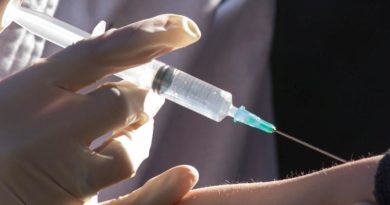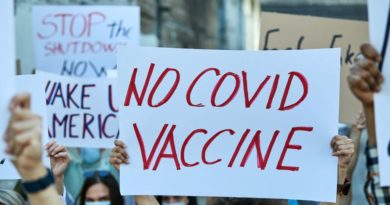Don’t Grant Global Meat Corporations Immunity, Hold Them Accountable for COVID-19 Failures

As the Senate reconvenes this week, a lobbying blitz to grant corporations special immunity protection is ramping up. Global meat companies are helping lead the charge, and it’s easy to see why. The Food and Environment Reporting Network (FERN) reports that as of September 4 at least 200 meatpacking workers (mostly immigrants or refugees) have died due to COVID-19, and almost 42,000 workers have tested positive. Time and again during the pandemic, these global meat companies have resisted providing protective equipment for workers, granting paid sick leave and publicly reporting testing results. Congress should ditch demands for absolute corporate liability protection and instead confront the risks and harm of a handful of global meat companies with too much market and political power that aren’t acting in the public interest.
The handful of global companies that control much of U.S. meat production, like Tyson, JBS, Cargill and Smithfield, are already facing lawsuits from workers and their families charging that the companies did not provide a safe workplace in the face of the pandemic. As the pandemic continues, and worker illnesses and deaths rise, more legal challenges are expected.
Meatpacking workers abandoned
Meatpacking workers are left with little recourse after the Trump administration has abandoned them by taking a series of steps, often at the direction of global meat companies, that leave workers and their families at risk of COVID-19 infection and transmission. Just a few days after an April full page ad by Tyson Foods in The Washington Post called on President Trump to use the Defense Production Act to re-open closed or slowed-down meatpacking plants, the president issued an executive order that did just that. The Occupational Safety and Health Administration (OSHA) and the Center for Disease Control (CDC) have issued only voluntary, not mandatory, worker protection guidelines and do not require the companies to report cases.
OSHA additionally offered to support meatpackers in any litigation brought by workers related to workplace exposures to the virus, if the companies made a good faith effort to comply with the voluntary guidelines. During the pandemic, the U.S. Department of Agriculture has granted waivers to companies so they can increase line speeds in meatpacking plants and is now proposing a new rule to ramp up poultry line speeds even further. Faster speeds require workers to stand closer together to keep up with the line and increase their COVID-19 risk. Trump’s Health and Human Services Administrator has dutifully echoed the meat industry’s talking points by blaming workers’ “home and social conditions” for spreading the disease. And when Colorado public health officials wanted to shut down the JBS plant in Greeley due to an outbreak, Vice President Mike Pence intervened and pushed back to keep the plant running.
Meatpackers had warning of risk to workers
The Trump administration’s all out defense of the meatpackers shouldn’t obscure just how unprepared these global giants were for a pandemic they should have seen coming. Smithfield’s parent company, the China-based WH Group, has processing plants in Wuhan, the presumptive site of origin of COVID-19, and in surrounding Chinese provinces. These plants were shut down in late January to prevent further transmission of the virus. U.S.-headquartered Cargill, with extensive operations in China including Wuhan’s province Hubei, has boasted that it had learned valuable lessons from its COVID-19 experience in China. Tyson Foods has multiple plants in China and after the outbreak there formed an internal coronavirus task force as early as January.
The industry was warned years before the COVID-19 outbreak about the risk to workers from a pandemic. ProPublica reported how 15 years ago the U.S. meat industry was part of a pandemic planning task force during the Bush administration. Over the ensuing years, the industry repeatedly received warnings about how a pandemic could spread within its workforce, how a pandemic would require social distancing inside plants and that each company should start to stockpile protective gear for workers. Yet, these global companies, with extensive risk management divisions, largely ignored the threat or chose not to plan for it.
The meatpacking plant production model developed by these global companies is particularly at risk for the spread of the virus, whether the plant is in Iowa, China, Germany or Brazil (all of which have seen COVID-19 outbreaks at plants). These processing plants are known for their sheer size, factory-style design, and continuous push to increase line speeds and process more animals quickly. The global meatpackers directly recruit immigrant or refugee workers, with little power in the workplace to push for protections, working elbow-to-elbow to keep up with faster lines. These are conditions that former OSHA administrator Debbie Berkowitz warns are ideal for the spread of COVID-19.
Meatpackers repeatedly resisted protective action
Once the outbreak hit in the U.S., time and again these companies acted to block, delay and deflect meaningful action to protect workers,such as slowing production lines, requiring and providing masks, installing Plexiglass shields, improving filtration in their ventilation systems and other recommended safety measures. The Washington Post reported in April that Smithfield, Tyson and JBS continued to operate business as usual, not providing their employees with protective gear. FERN reported in May that Tyson, JBS, Cargill, National Beef and Smithfield were all holding numbers of COVID-19 cases as confidential business information, neither sharing the data with workers, community members or local and state public health officials nor providing national and international-level data. The companies also actively resisted efforts by workers and state and local officials to increase worker protections.
Chinese-owned Smithfield had to be pressured by a worker lawsuit in Missouri to finally add appropriate protections at its Milan processing plant. The company tried unsuccessfully to block federal investigators looking into labor violations connected to the company’s Sioux Falls plant outbreak. In Wisconsin, Smithfield hid the number of employees who had tested positive and pressured them to keep working while unprotected, according to The Intercept. In Iowa, Smithfield refused to release test data in May from its Des Moines plant. Smithfield’s CEO, in a letter to the Nebraska Governor, dismissed safety protections for their workers, writing, “Social distancing is a nicety that makes sense only for people with laptops.”
Brazil-owned JBS issued a cease and desist order in Colorado when a union representative criticized the company for rushing to re-open a plant with over 120 positive tests. In Texas, the company initially refused efforts by health officials to test its workers. Workers at JBS’s Green Bay plant had to file a complaint with OSHA in order to get proper protective gear. In Minnesota, the company refused to allow worker safety officials to enter its Worthington plant for an inspection in April, according to the Star Tribune. Minnesota’s Department of Health had to test all 2,000 of the workers there after the company refused to do so. The Star Tribune also reported that JBS may have actually helped spread the disease by transporting workers from the COVID-19 hotspot Smithfield plant in Sioux Falls to the JBS plant in Worthington. A ProPublica investigation showed JBS exerting political pressure to resist public health officials in Nebraska and Colorado calling to shut down plants over worker safety concerns.
U.S.-headquartered Tyson Foods, which has by far the most COVID-19 cases among meatpackers, resisted efforts to disclose the number of workers affected at its Sioux City plant and its Storm Lake plant, in North Carolina and in East Texas. The company finally announced in July it would be more forthcoming on testing. Tyson poultry plants in the South were slow to issue protective gear leading to extensive exposure to workers, according to the workers union. A Tyson employee in Georgia died from COVID-19 after being ordered back to work by the company, reported the New York Times. In Arkansas, Tyson refused to hear from workers who requested paid sick leave related to COVID-19, as it drafted media quotes for local officials to tout the safety of their plants. In Kentucky, the company blamed its Burmese refugee workers for the spread of the virus at their plant. In Kansas, Tyson heavily lobbied behind the scenes to get exceptions for meatpacking workers under quarantine guidelines, allowing exposed workers (without symptoms) to stay on the job, despite knowing that many carriers are asymptomatic. In June, Tyson Foods announced it would return to its previous policy of punishing workers who missed time due to illness.
The push for immunity
Now, it’s a full court press in the Senate, led by Senate Majority Leader Mitch McConnell, to grant corporations sweeping immunity protection for five years, as long as the company can show it made a reasonable attempt to comply with voluntary CDC/OSHA safety guidelines to protect workers. A Public Citizen analysis of the proposed corporate immunity bill outlines the gaping loopholes in the CDC/OSHA voluntary guidelines for meat and poultry processing. The loopholes would make it nearly impossible for workers to successfully sue meatpackers under the proposed law. The Intercept reported that Smithfield has a lobbying team focused on winning immunity protection for the company. The company increased donations to Republican State Attorneys General, which immediately jumped to call for broad business immunity from civil claims related to the pandemic. The meat industry and other powerful sectors are building upon work at the state level led by the American Legislative Exchange Council (ALEC), which has already passed some variation on corporate immunity protections in 13 states.
Given the industry’s track record, corporate immunity would likely open the door for more abuses that directly put workers lives and those that live in meatpacking plant communities at risk. The United Food and Commercial Workers Union President Marc Perrone commented, “Immunity laws could send dangerous messages that the safety of these workers is not the company’s responsibility.” More than 200 organizations, including IATP, have urged Congress to reject the industry’s push for corporate immunity.
Rising calls for accountability and enforcement
The debate over corporate immunity comes as the global meat companies’ pandemic response is drawing increased scrutiny from some members of Congress.
- In August, Sen. Michael Bennett from Colorado called for an Inspector General investigation within the U.S. Department of Agriculture and the Department of Labor on federal actions that may have helped to spread COVID-19 crisis in meatpacking plants, including how the president’s use of the Defense Production Act may have affected workers.
- In June, Sens. Cory Booker (D-NJ) and Elizabeth Warren (D-MA) launched their own investigation of the industry, concluding that the meatpackers continued to be evasive about reporting cases, increased consumer prices and lower prices paid to farmers and ranchers, even as the companies increased exports.
- 19 senators called on the Justice Department to investigate the beef industry, specifically around the companies’ actions during the COVID-19 crisis. The senators’ call followed a similar request from State Attorneys General from 11 beef producing states for the Justice Department to investigate competition issues in the beef industry. The Justice Department was already investigating the poultry and beef industries for price fixing, issuing subpoenas to Cargill, Tyson, JBS and National Beef seeking information on possible collusion.
- In April, Sen. Josh Hawley (R-MO) and Sen. Tammy Baldwin (D-WI) called on the Federal Trade Commission to launch an antitrust investigation into “growing concentration in the meatpacking and processing industry, and any anti-competitive behavior resulting from this concentration.
Concern about excess market power in the meat industry is not new for workers, farmers and ranchers. One hundred years ago, the federal government launched an investigation into market manipulation and price fixing, followed by an antitrust consent decree with the five big meatpackers of the time and the passage of the Packers and Stockyards Act (PSA). The PSA was designed to ensure competition and transparency in the marketplace.
In 2009, the Obama administration’s Department of Agriculture and Department of Justice held hearings around the country to investigate anti-competitive behavior within the agriculture sector, including powerful testimony from farmers and ranchers on unfairness they experienced in meat and poultry markets. The result was a report, no concrete action, and increased farmer and rancher cynicism that the government will stand up to the industry. In 2018, USDA Secretary Sonny Perdue ended the stand alone agency that enforced the PSA and moved it under the department’s Agriculture Marketing Service, whose mission is to promote the industry.
Now, nearly 100 years after the passage of the PSA, Congress and federal agencies are long overdue to examine whether the meat industry has too much power over farmers, workers and our food supply.
Since the PSA was passed, fewer companies (for example, four companies control 80% of the beef industry) control the sector. The giants in the industry have operations all over the world and have become horizontally powerful with a company like Tyson dominant in beef, poultry and pork — the so-called protein market. The introduction of corporate contracting in poultry and hogs has shifted the costs and risk to farmers, while allowing companies to become vertically integrated, owning the animals, the processing and the product in the supermarket. The companies have driven the rapid expansion of large-scale confined animal feeding operations and associated water and air pollution, and the disappearance of small to mid-sized producers and processors.
An assessment of the industry and our laws to hold it accountable is badly needed. Last year, Sen. Cory Booker (D-NJ) and Rep. Mark Pocan (D-WI) introduced the Food and Agribusiness Merger Moratorium and Antitrust Review Act. It would impose a temporary moratorium on mergers and acquisitions between large farm, food and grocery companies, and establish a commission to review large agriculture, food and beverage manufacturing, and grocery retail mergers, concentration and market power. The commission would make recommendations on how to improve the Sherman Act, the PSA and other federal regulations to ensure a fair and competitive agriculture marketplace. IATP is one of 219 groups that signed onto a letter to Congress in support.
The pandemic has also raised larger, more troubling issues about the enforcement of existing rules. In several of the cases chronicled above, these global companies told local and state government officials “no” when asked to take action to protect workers or to make public health data available. Their political influence brought protection from the president, his administration and state governments.
OSHA has the power to issue an emergency mandatory protection standard for meatpacking workers, but bluntly refuses to do so. Worker-led organizations like the Food Chain Workers Alliance and the United Food and Commercial Workers and over 200 organizations have called on Congress to pass the Every Worker Protection Act to compel OHSA to do its job — to issue an emergency standard and enforce employer compliance with it.
The pandemic has exposed the risk to meatpacking workers, farmers and rural communities, and consumers from allowing a handful of global meat companies to control the sector. The absolute liability protection the meatpackers and other corporations are demanding will allow them to continue to put lives at risk, with impunity. Instead, Congress should stand up to global meatpackers and immediately compel OSHA to protect workers — and take steps to address the broad-reaching risks of concentrated corporate control of the industry.
*
Note to readers: please click the share buttons above or below. Forward this article to your email lists. Crosspost on your blog site, internet forums. etc.
*** This article has been archived for your research. The original version from Global Research can be found here ***


